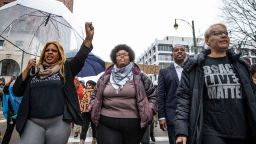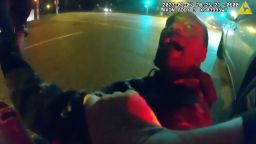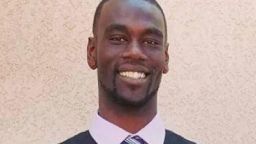Editor’s Note: This article contains graphic videos and descriptions of violence.
Weeks after Tyre Nichols was brutalized by Memphis police officers, city law enforcement officials are being hailed for their unusually rapid investigation and transparency compared to similar cases in other US cities.
Five former officers were indicted Thursday on charges of second-degree murder and kidnapping. One day later, officials released police body camera and street surveillance footage of the deadly encounter after a January 7 traffic stop.
“If we look at some past incidents in our country, there’s been some mistakes made,” said Ron Johnson, a former Missouri State Highway Patrol captain, referring to the handling of previous cases of police brutality. “I think a lot of things have been done right” in this case.
“A year ago, two years ago, we wouldn’t have seen some of the things we’re seeing here,” Johnson said of Memphis law enforcement’s handling of Nichols’ death.
The swift filing of charges and release of video contrasts with what happened in some previous instances of deadly police violence – including the fatal shooting of Breonna Taylor by Louisville, Kentucky, police in 2020 and the death of George Floyd at the hands of Minneapolis police the same year.
But some initial statements from Memphis police were vague or misleading – as they were in the cases of Taylor and Floyd.
In Taylor’s case, an initial statement from police about the botched raid in which the 26-year-old was killed said there was no forced entry. But officers had used a battering ram to enter her home before shooting her. Minneapolis police initially said Floyd “appeared to be suffering medical distress.” But video showed Officer Derek Chauvin kneeling on Floyd’s neck for several minutes.
In Memphis, police initially said that Nichols was pulled over by officers for reckless driving and a “confrontation” followed before Nichols ran away prior to a second “confrontation” with police.
Memphis Police Chief Cerelyn “CJ” Davis told CNN that on hearing that initial account she thought it was “just a strange summary of what occurred on a traffic stop.” Once she viewed video of what actually happened, she was “outraged,” she said.
Investigators have so far been unable to find evidence to corroborate the claim that Nichols was driving recklessly, the chief said Friday.
Still, law enforcement and legal analysts are now pointing to Memphis’ actions as a new example of how to maintain trust in the community after fatal police encounters.
“We’re in a new era of accountability,” said CNN legal analyst Joey Jackson, noting the proliferation of police body cameras and cell phone and surveillance video that capture violence by officers. “The more we have these instances that are caught on camera, the more public is outraged, the more there is demand for accountability.”
Here is what Memphis law enforcement officials got right in the days since the beating that led to Nichols’ death, according to experts.
Looking at police ‘through a different prism’
The incident that reignited long-simmering tensions over fatal police encounters with Black men started when Nichols, 29, was pulled over on the night of January 7 for alleged reckless driving, according to the Memphis Police Department.
Police initially issued the statement about a “confrontation” between officers and the driver – later identified as Nichols – who then fled on foot. Officers caught up to the man and “another confrontation” resulted in Nichols’ arrest, police said.
An ambulance was called to the scene after Nichols complained of shortness of breath, according to police. He was taken to a nearby hospital in critical condition. Three days later, the Tennessee Bureau of Investigation announced Nichols had died from injuries sustained in the “use-of-force incident” with officers, according to the statement.
Officials have not released Nichols’ autopsy report.
The preliminary results of an autopsy commissioned by attorneys for Nichols’ family said he suffered “extensive bleeding caused by a severe beating,” family attorney Benjamin Crump said this week.
The full independent autopsy report is not yet ready, Crump told CNN.
After the incident, the five officers were relieved of duty – a standard departmental procedure while their use of force was investigated, police said. The Tennessee Bureau of Investigation and the Shelby County District Attorney’s Office were enlisted to investigate.
Read more
- What we don’t know about Nichols’ death
- Nichols was a ‘good kid’ who enjoyed skateboarding and photography
- A timeline of the case so far
- Those who have seen the video describe it as horrific
- Read this before you decide to watch the video
- What we know about the SCORPION unit
- The video prompts renewed calls for police reform
- Who is the Cerelyn “CJ” Davis, Memphis police chief?
- What Memphis officials got right
On January 15, noting the serious nature of the officers’ conduct during the stop,Chief Davis vowed “immediate and appropriate action.” The department was “serving notice to the officers involved,” she said.
Three days later, the US Justice Department said a civil rights investigation has been opened into the death of Nichols.
“We are now looking at cops through a different prism and when cops don’t act, when cops allow an event to happen over four, five, ten minutes, then maybe they should be held responsible to an even higher standard,” Mark O’Mara, a criminal defense attorney and former prosecutor, said Saturday. “So we are in a new era, I think, of looking at police behavior under a different eye towards possible prosecution.”
Swift legal action a ‘blueprint for all America’
On January 20, after an internal investigation, Memphis police identified and fired five officers involved in the encounter, citing their violation of multiple department policies.
Officers Tadarrius Bean, Demetrius Haley, Emmitt Martin III, Desmond Mills Jr., and Justin Smith were terminated for failing in their “excessive use of force, duty to intervene, and duty to render aid,” the department said in a statement.
“The egregious nature of this incident is not a reflection of the good work our officers perform, with integrity every day,” Davis said.
Last Monday, officials showed Nichols’ family the video in which officers pummeled him like “a human piñata” – in the words of one of the family attorneys.
And on Thursday, the officers – all of them also Black – were charged with second-degree murder and kidnapping amid mounting public pressure to release footage of the incident.
“No one out there that night intended for Tyre Nichols to die,” said William Massey, Martin’s attorney.
Blake Ballin, an attorney for Mills, described his client as a “respectful father,” who was “devastated” to be accused in the killing.
“The police department obviously learned something from … other high-profile cases when district attorneys were not transparent, when they did not act quickly,” said Areva Martin, an attorney and legal affairs commentator.
“They did the right thing in this case by convening a grand jury, investigating the case quickly, and then charging these officers, bringing them into custody.”
Crump, in a news conference Friday, called Memphis’ rapid criminal charges – compared to other cities that have waited months or years in brutality cases – a “blueprint” for police departments, prosecutors and political leaders in future cases.
“We have a precedent that has been set here,” Crump said, calling the swift legal action a “blueprint for all America from this day forward.”
Memphis authorities appeared to be guided by a long national history of poor handling and missteps in brutality cases, according to Johnson.
“They’ve learned from them and it shows in their response,” said Johnson, who helped restore order in Ferguson, Missouri, after the 2014 fatal police shooting of Michael Brown, an 18-year-old unarmed Black man.
CNN political analyst Bakari Sellers said the swiftness of the charges reminded him of the case involving the April 2015 death of Walter Scott, who was fatally shot in the back after officers pulled him over for a broken brake light in South Carolina.
Former North Charleston police officer Michael Slager was arrested days after the shooting and indicted on a murder charge two months later. The former officer’s 2016 state murder trial ended in a mistrial but Slager pleaded guilty to violation of civil rights by acting under the color of law in Scott’s killing. He was sentenced to 20 years in federal prison.
“That was the only time I’ve seen anything happen as quickly as this,” Sellers said.
Mostly peaceful protests after video release
Twenty days after Nichols’ traffic stop, Memphis officials released the video.
They waited until 7 p.m. Friday to publicly release the agonizing footage of Nichols’ fatal encounter with officers, allowing time for local politicians, activists and Nichols’ family to make pleas for calm in the community.
“The last thing you want to do is take a high tension event and then add that thing that’s going to increase tension … on a Friday night knowing that people don’t have to be at work in the morning and they have the whole weekend ahead of them,” said CNN law enforcement analyst John Miller.
But, Miller said, the delay allowed authorities to show the public “the wheels of justice are turning and turning relatively quickly.” The additional time also allowed officials to “unite the faith community in Memphis, the voice of the family and the family’s lawyers, and the key community contacts” in calling for calm.
Hours before the video release, Memphis’ police chief sought to prepare the community, saying the footage would show “acts that defy humanity.”
Still, authorities braced for potential civil unrest.
Police departments across the country – including in Los Angeles, Atlanta, Minneapolis, Nashville and New York – said they were either monitoring events or already had plans in place in case of protests.
“We’ve watched so many of these cases over the last several years,” Martin said. “And when (law enforcement authorities) come forward and when they’re transparent and they provide information to the community, we typically see a very peaceful response.”
Mostly peaceful protesters in Memphis took to Interstate 55 Friday night after the videos went online, blocking both lanes of the highway’s bridge connecting the western Tennessee city to Arkansas. There were no arrests.
Video raises unanswered questions
In the video, Nichols screamed for his mother and the officers struck him multiple times, including punches to the face while his hands were restrained. “Mom!” Nichols yelled out in anguish. At one point officers are seen hitting him at least nine times without visible provocation.
Though paramedics arrived minutes after officers disengaged, Nichols appeared to be left multiple times on the pavement without assistance before an ambulance showed up.
The footage stunned hardened law enforcement experts. Officials across the country expressed outrage – including President Joe Biden, who said it was “yet another painful reminder of the profound fear and trauma, the pain, and the exhaustion that Black and Brown Americans experience every single day.”
The five former officers accused in the fatal beating of Nichols were members of a recently created unit that tackled rising crime in the city. Launched in 2021, the SCORPION unit – Street Crimes Operation to Restore Peace in Our Neighborhoods – was heralded as a direct response to the city’s worst crime, targeting homicides, robberies, assaults and other felonies.
On Saturday, Memphis PD said it had permanently deactivated the unit after “listening intently to the family of Tyre Nichols, community leaders and the uninvolved officers who have done quality work in their assignments.
“The officers currently assigned to the unit agree unreservedly with this next step,” Memphis PD said in a statement.
“While the heinous actions of a few casts a cloud of dishonor on the title SCORPION, it is imperative that we, the Memphis Police Department take proactive steps in the healing process of all those impacted. The Memphis Police Department remains committed to serving our community and taking every measure possible to rebuild the trust that has been negatively affected by the death of Mr. Tyre Nichols.”
Cheryl Dorsey, a retired sergeant with the Los Angeles Police Department, said the footage of Nichols’ fatal encounter has left many unanswered questions about what Memphis PD did to prevent the tragedy.
“All of this was preventable,” she told CNN Saturday. “You have officers who are young on the job, unsupervised out there doing what they do on a regular basis. This was not anything that they aren’t accustomed to doing.”
Memphis City Council Chairman Martavius Jones grew emotional after watching the video, telling CNN that despite the positive shift in the handling of brutality cases, much more needs to be done.
“It’s the culture of policing that says that when you have a Black motorist, we can treat them any type of way,” he said.
“We just have to change the culture … We have to hold people accountable. We have to let the legacy of Mr. Nichols be that there is going to be police reform not only here in Memphis but in this country.”
CNN’s Mark Morales, Shimon Prokupecz, Don Lemon, Jamiel Lynch, Jason Hanna, Elizabeth Hartfield, Travis Caldwell, Sara Sidner, Andi Babineau, Nick Valencia, and Chandelis Duster contributed to this report.
"right" - Google News
January 30, 2023 at 11:41PM
https://ift.tt/yPfE1sm
'A new era of accountability.' What Memphis got right after the death of Tyre Nichols - CNN
"right" - Google News
https://ift.tt/NvMeaCw
Bagikan Berita Ini




















0 Response to "'A new era of accountability.' What Memphis got right after the death of Tyre Nichols - CNN"
Post a Comment